The popularity of generative artificial intelligence, a term that describes technology that can generate various media in response to short prompts, has risen dramatically over the past months.
The text-based platform ChatGPT is especially infamous for being able to write coherent, page-long essays on request. The software is free and takes only moments to complete users' prompts. Nearly a third of college students have used ChatGPT on written assignments, according to a study done by intelligent.com last January.
A new update from MSU IT, which was also shared to students in an email last Tuesday, warned that users should be mindful of the kinds of data they share with generative AI products.
“Although generative AI products may claim to have some privacy safeguards in place, users should assume that all consumer generative AI products make data publicly available unless otherwise indicated per explicit official agreement with Michigan State University,” the article said.
Currently, MSU does not have an official agreement with any AI software.
The article reminded users to abide by MSU’s institutional data policy, which prohibits the sharing of confidential data. Personal data, like social security numbers and sensitive data, like unpublished research findings, should also remain private.
The article also said "further guidance regarding more specific needs like handling generative AI in teaching and learning" is to come in the following months.
MSU computational math science senior specialist Dirk Colbry, who will co-teach a graduate course on the uses of generative AI in science and engineering this fall, said some of his colleagues are worried artificial intelligence is a sign of an apocalyptic future.
“Educators are always worried when new technologies change the focus of their teaching,” Colbry said.
He pointed to other technologies that were once feared but now seen as the norm, like calculators and search engines. Colbry said MSU recently sent a statement to instructors recommending that “academic units seek ways to work with, not in opposition to, generative AI."
“Now that the technology exists, it will not go away,” Colbry said. “We need to adjust our learning goals and evaluation metrics to accommodate these new technologies.”
Computer science and machine learning graduate student Hemanth Yalamanchili said he appreciates that MSU is trying to stay up to date with new AI technologies.
While he believes schools should teach students to use the tools that are at their disposal, Yalamanchili said, assignments that can be completed solely by ChatGPT aren’t valuable to students.
“This technology is just the beginning of a wave of technologies that will be rapidly changing and improving, and the only way to get ahead of any issues is to understand it,” Yalamanchili said.
He added that professors who do not acknowledge the potential effects of new AI technologies in their curriculums are “not performing to the best of their duties."
Support student media!
Please consider donating to The State News and help fund the future of journalism.
Discussion
Share and discuss “MSU releases guidelines for the use of generative AI” on social media.







